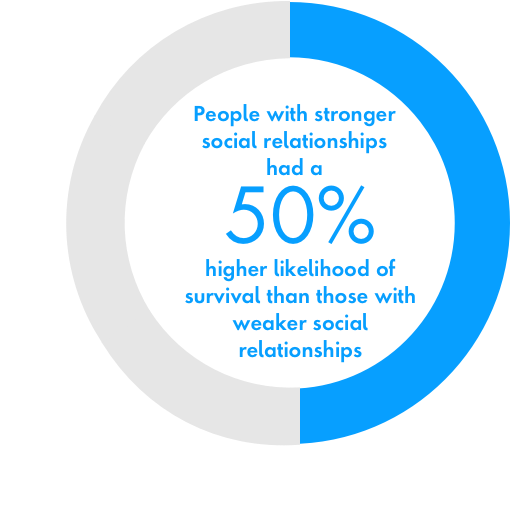Cancer has a profound impact on people and the workplace. As an often all-encompassing condition, it requires organizations and employers to creatively formulate transformative solutions that help balance work and life for affected employees and teams. Digital supportive care services can help employers provide meaningful, personalized support to employees, leading to positive outcomes for both employees and businesses.
What issue can we solve for you?
Type in your prompt above or try one of these suggestions
Suggested Prompt



The Value of Digital Support for Employees Working with Cancer

Meet Cecelia
A successful, mid-career accountant at a top firm, Cecelia knows how to navigate the most challenging situations with confidence and poise. Yet today, in a critical meeting with clients and colleagues, Cecelia is distracted. Finally, the call she has been anxiously awaiting comes, and she steps out of the meeting room. In the span of a heartbeat, Cecelia’s world turns upside down. Her physician confirms what Cecelia has feared the most: she has stage 3 ovarian cancer.
Employers can create a positive business impact by supporting people working with cancer

Cecelia’s situation is not unique. In fact, 45 percent of people diagnosed with cancer are between the ages of 20 to 64, the traditional working age. Despite considerable research published about health and the workplace, and real interest in supporting employees, there’s a limited understanding of how employers can best support the needs of employees impacted by cancer today, in a post-pandemic world where the nature of work and healthcare has shifted significantly.
Looking back at the U.S. in the early 2000s, the annual health-related productivity losses were estimated to reach some $260 billion due to absenteeism as well as presenteeism—being present at work but working at a reduced capacity. Back then, virtual healthcare seemed out of reach.
Fast forward to today, when seismic changes in remote working and the wide adoption of telehealth ushered in by the pandemic have changed the environment for people working with cancer and their caregivers.
These changes raise questions about what people with cancer, like Cecelia, need in today’s workplaces, and what opportunities employers have for providing digital and other support to create positive outcomes for both employees and businesses.
Supportive care helps cancer patients navigate immense uncertainty and stress
Supportive care, which includes complementary care alongside medical treatment, is an essential part of cancer treatment that is focused on treating the whole person. A patient’s medical care team may engage in supportive care by helping a patient manage symptoms, make decisions and access psychological, financial or other support services. Outside of the immediate medical care team, a patient may also receive emotional, spiritual and logistical support from friends, family and their community.
Supportive care has many benefits. It has been shown to improve the quality of life for cancer patients, enhancing physical and emotional well-being, reducing pain and alleviating symptoms. Additionally, supportive care can help cancer patients tolerate treatment, prevent hospitalizations, shorten hospital stays and improve survival rates.
Strong social relationships are an impactful form of support
Social relationships, like supportive care interventions, are a form of support. The link between social connection and physical and mental health has been well documented: Those who have meaningful and deep connections with others are more likely to be healthy and have better health outcomes.

A meta-analysis found that people with stronger social relationships had a 50 percent higher likelihood of survival than those with weaker social relationships—and more complex social integration measures, like the breadth and depth of relationships across various communities (families, social clubs, places of work or worship) point to an even bigger impact. Even the perception of social support increased survival by 35 percent.
For cancer patients, support of all kinds can help them navigate the immense uncertainty and stress of a cancer journey that likely impacts multiple facets of their life, from diagnosis to posttreatment.
Digital supportive care improves patient health outcomes
Digital supportive care uses technology to deliver complementary care—and there’s proof it improves health outcomes. A study published by the Memorial Sloan Kettering Cancer Center in New York involved approximately 1,000 cancer patients who reported their health outcomes to their care team through a website. Patients who regularly engaged in this digitally enabled supportive care experienced a 31 percent increase in quality of life, a seven percent decrease in emergency room visits and a five-month increase in survival.
In collaboration with the Duke Cancer Institute, Publicis Sapient codesigned a connected intelligent supportive care platform and patient-facing app to maximize the opportunity for patients to get the right supportive care at the right time. The patient-facing app provides the ability to explore supportive care services, report and track outcomes, for example, patient-reported outcomes (PROs), and receive personalized content and resources. Captured data enables the supportive care team to assess patient needs, and more effectively measure supportive care impact on outcomes.
Meaningful support delivers value in the workplace
The proven benefits of supportive care for cancer patients raise important questions about specific opportunities for employers to provide meaningful support that delivers value to employees and, in exchange, value to the business. These opportunities may take multiple forms, for example:
- Policies: providing job security, extended leaves and enhanced medical benefits
- Programs: creating business resource groups such as (BRGs) and employee resource groups (ERGs), requiring manager training and/or offering mentors or personal guidance to help integrate the demands of managing work and treatment
- Provisions: digital tools to navigate health-related workplace issues
Employers realize the value of this support. For the past decade, they have entered the arena of supportive care by incorporating virtual physicians, therapists, coaches and other programs into health benefits packages to entice employees to keep building their careers at their organizations.

Digitally enabled supportive care can provide an employee, such as Cecelia, with on-demand access to a mobile coaching app to help navigate complicated workplace conversations and intense psychological stress. The need is real: 50 percent of cancer patients are afraid to tell their employer about their diagnosis, despite 92 percent feeling that support at work positively impacts their health.
Data shows that over half of employees don’t understand or even read about their benefits because they are not top of mind or are too complicated. Workplaces must commit to letting employees know that they can expect a supportive experience through treatment and recovery.
How to design workplace-specific supportive care
The health industry is littered with content, apps and digital experiences that no one uses. To be adopted, used and ultimately impactful, solutions must be rooted in and informed by human behavior and values. At Publicis Sapient, we believe that to have an impact, health services must be deeply human-centric.
With this in mind, we used our collective expertise to develop initial hypotheses about the connection between cancer and work. Then, our nimble team* meticulously reviewed 48 academic articles from 40 publications and publishers, covering over 15 unique focus areas that spanned 14 countries. The articles included seminal studies from the 1970s and 1990s, as well as groundbreaking work published this year, from esteemed journals such as the Journal of Clinical Oncology, JAMA, and European Journal of Cancer.
Our review reveals six themes as a springboard for support opportunities.
1. Social support is a key component of health and a healthy workplace
Research shows that employees consistently prioritize social support, effective communication and supportive leadership in a healthy workplace. Also, support at work looks different for everyone and at each workplace, with desired privacy levels and support differing based on personal preferences.
Most employees who are diagnosed with cancer choose to work through treatment, albeit sometimes intermittently or with reduced hours. Employers must prioritize an employee’s desire to continue to meaningfully contribute professionally—and strive to create a safe, supportive and inclusive environment where employees can benefit from the support of their colleagues, as desired, without fear of discrimination, and with the autonomy to determine what health information is shared and with whom.
In addition, employers must consider programs designed to enable peer-to-peer support for patients and caregivers, for example, a virtual community that connects those who need support with a mentor who has navigated a similar journey.
2. Financial stress can be toxic to employee health and workplace contribution
Financial toxicity is the financial burden and distress caused by cancer care, which can lead to negative health outcomes such as skipping treatment. Lost workdays, poor work ability and changes to employment increase the risk of financial toxicity as does job lock, which is the inability to leave a job freely due to lack of health insurance portability.
For employees with cancer, like Cecelia, this means employers must consider providing access to additional resources, such as digitally enabled financial counseling for managing medical bills, to mitigate the risk of financial toxicity.
Employers also have an opportunity to evaluate current policies, considering the risk of future financial toxicity, and take steps to create safeguards to protect against it, including short- and long-term disability policies, critical illness insurance, medical procedure prepayment (which is not a common practice in some countries) and job and benefits protection.
3. Fear and loss are amplified in the workplace
Employees with cancer not only face the challenges of diagnosis and treatment but also the added stress of job fear and insecurity. Whether actual or anticipated, changes in job performance can contribute to a sense of insecurity, and individuals with cancer are more likely to experience job loss. This double loss of health and employment creates emotional and practical barriers to returning to work.
To support employees like Cecelia, employers must invest in strategies for workplace flexibility, including workload and type of work. They must also empower employees with cancer to seek accommodations that meet their needs and enable meaningful contributions without fear of retaliation.
4. Differing perceptions of cancer stigma impact workplace dynamics
Many people living with cancer perceive their condition as highly stigmatized in the workplace, yet one study showed most employers don’t acknowledge the likelihood of cancer-related stigma. Employers often fail to recognize this stigma, which is rooted in outdated beliefs about cancer mortality and concerns about work accommodations and recurrence.
Publicis Sapient’s research found that employees of all health statuses are worried about repercussions or judgment at work due to health, suggesting that health in the workplace is a sensitive topic for all employees.
Cancer-related stigma in the workplace may arise from well-intended decisions that have a negative impact. For example, Cecelia’s team members removed her from a group text while she was recovering from surgery because she “shouldn’t need to worry about work”. Even after completing treatment, Cecelias manager refused to let her lead a significant project, rationalizing that too much stress may lead to recurrence. Employees with cancer, like Cecelia, may feel isolated and compromised by such well-intended exclusions.
Employers can help mitigate stigma by providing education about stigma, its impact and the realities of working with cancer via digitally enabled or blended learning sessions or as a part of regular ongoing manager training.
5. Mindsets are malleable and are prime targets for employer intervention
People with cancer who adopt an adaptive (helpful) mindset, such as viewing cancer as manageable, tend to report a higher quality of life compared to those with a maladaptive (harmful) mindset, such as viewing cancer as a catastrophe. This research highlights the influence of mindset on health outcomes. Having a positive mindset can be influenced through interventions like reframing activities.
To support employees with cancer, employers must consider providing targeted and timely mindset interventions to promote more adaptive, healthier ways of thinking. For example, coaching or small group support programs can help impacted employees find meaning in their experience through facilitated discussion, one-on-one conversations, or even journaling prompts that encourage reflection and reframing, whether through on-demand digital or hybrid programs.
One example of digital coaching is the Day by Day platform and app developed by Publicis Sapient for Duke Health. This innovative digital coaching platform—the first-ever in a clinical setting—equips patients and caregivers with knowledge and tools to take actions to improve their recovery and health. The app delivers live, relevant digital coaching dialogue through a purpose-built platform, including delivery of video, call, messaging, health tracking and content, based on an understanding of the practical and emotional needs of the patient.
6. Health trauma and identity transformation can lead to growth
People undergo transformations in their identity and beliefs during their cancer journey. For some, this leads to positive outcomes, like post-traumatic growth. For others, it can lead to negative impacts on their mental and physical health.
For employees with cancer, like Cecelia, employers must be prepared to support and accommodate transformations in employee identity and their work values. This can be provided through coaching and group support during the recovery periods posttreatment or reskilling them to a role that better suits their new identity.
By supporting employees with cancer, organizations can reap benefits like increased retention and productivity. They can build a diverse, inclusive culture that benefits from stronger leaders and team members who can thrive at work during treatment, and who emerge with greater empathy, an increased sense of purpose and renewed loyalty to their company. Ultimately, employer support for cancer in the workplace can positively impact health outcomes, including saving lives.
Join us in the fight against cancer.
In 2022, Arthur Sadoun, CEO of Publicis Sapient’s holding company, was diagnosed with and treated for cancer. After making his condition public, he received thousands of messages that exposed the fear people with cancer experience, not only for their lives but also for their jobs.
Soon after, Working with Cancer (WWC) was launched to abolish job fear and insecurity for those impacted by cancer or chronic illness. The WWC movement, which has the backing of more than 1,300 pledge companies worldwide, is committed to providing a more open, supportive and recovery-forward culture at work for all employees with cancer.

Most people experience positive support at their places of employment when they face a cancer diagnosis—but fear they will not. Official policies close the gap between expectations and reality. If your company has not yet taken or activated the Working with Cancer pledge and you’d like more information, please visit workingwithcancerpledge.com.







